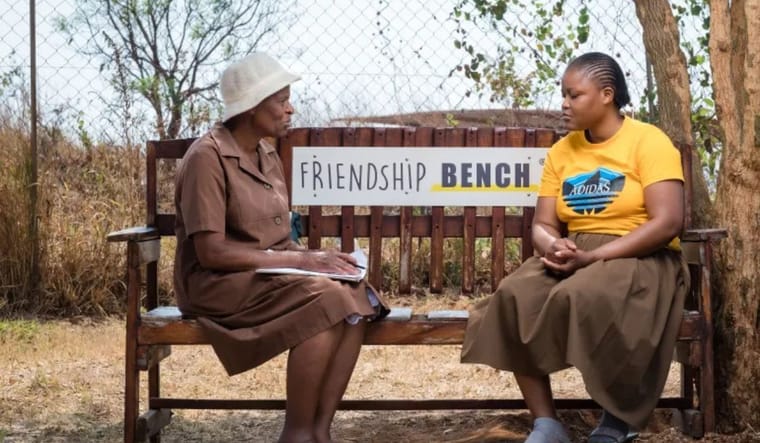In This Messy World, Aiming for Perfection is Futile. Michael Schur, Best-Selling Author and Creator of The Good Place, Shows Us How to Be Just a Little Bit Better Every Day
Anyone who’s ever driven in Los Angeles experiences a few, simple truths: You will get stuck in traffic; other drivers will make questionable moves that will prompt serious frustration at best and rage at worst; and these things will not inspire you to be a better person.
Yet for Michael Schur—a writer on TV shows like Saturday Night Live and The Office—a fender bender on an LA freeway is exactly what sent him on a path toward being better, if not perfect.
In fact, this little accident and what happened afterward prompted Schur to research the moral theories of thinkers like Aristotle and Immanuel Kant and reach out to present-day philosophers to understand why he felt bad about how that minor freeway incident played out. (Read on for the specifics!) It led Schur down an ethics rabbit hole that inspired him to create The Good Place, a comedic exploration of what makes someone a good person, and ultimately to write his new book: How to Be Perfect.
We sat down with Schur to chat about what he’s learned in the course of his self-guided education on ethics, how he uses these theories to live a more authentic, purpose-driven life, and his best advice for the rest of us trying to do our best navigating the LA freeways and beyond.
A Conversation with Michael Schur
You write that you created The Good Place out of an abundance of interest in moral philosophy. Can you take us into that journey that led to the show and your new book? It involves a small fender bender, right?
In 2005, my wife got into a minor fender bender. A cop looked over the cars and didn't see any damage. Then we got a claim for $836 because the guy said he had to replace the whole fender. This was all during Hurricane Katrina, so I got on a kind of moral high horse and said, “How about this? I'll donate $836 in your name to the Red Cross if you agree not to get your fender fixed.” And he was sort of like, “Alright, I'll think it over.”
I was working on The Office at the time and I told everyone I worked with that story. They started pledging more and more money if this guy would agree not to get his fender fixed. This was pre-Twitter, pre-Facebook, pre-everything, but I put up a blog and it went viral. So, one thing led to another and people started donating thousands and thousands of dollars, under the pretense that this guy would agree not to get his fender fixed.
I was absolutely convinced of my moral superiority and after a couple days we hit around $27,000. I was 100% sure that I was in the right. Then, I started getting media requests and it just spiraled out of control very quickly. The guy didn't know any of this was happening, and suddenly my wife and I were like, Well, this is wrong and bad and we don't know why.
I started reading stuff about ethics and I sent a bunch of emails to a bunch of professors and said, “Can I talk this through with you?” Eventually I learned why what I was doing was wrong; I was shaming him. Hurricane Katrina had nothing to do with this fender bender at all. He was saying, “I would like you to repair my car,” and I was saying, “Well, you shouldn't care about that because there's this other thing over there that's way more important,” which is just not an OK way to negotiate a minor disagreement between two people.
I ended up paying him the full amount and a lot of the money still got donated, but in the aftermath I had this feeling that if I had understood the basics of ethical theories, I could have saved a lot of trouble. So, that sparked my interest in the subject as a hobbyist and over the next 10 years, I slowly developed this idea for the TV show The Good Place.
You describe how even the most mundane tasks—buying clothes, going to the grocery store—are chock full of ethical dilemmas. How do you personally manage what you should do with what you want to do? What’s your best advice for the rest of us facing the same struggles?
I think it’s important to realize there are often not right decisions and wrong decisions, but better decisions and worse decisions. When you go to the grocery store to buy stuff for hamburgers, there’s a better kind of hamburger meat to buy (let’s say organically grass-fed cows) and a worse kind of hamburger meat (which is from a factory farm, full of hormones and pesticides). And then there might be a best kind of hamburger meat to buy, which is no hamburger meat at all because the beef industry contributes to global warming and climate change.
But sometimes you have to buy hamburgers because your kid wants a hamburger party, and you can’t always do the exact best. And by the way, if you do decide not to buy hamburger meat, you still drove to the grocery store in a car that’s probably polluting the atmosphere and you’re still wearing clothes that might have been made in a sweatshop in Southeast Asia without you knowing it.
So the idea here is that you can't be perfect. No one can be, and no one should try to be. Because if you do, you'll be paralyzed with indecision. The book is really about the idea that you should give up on the idea of being perfect and get more interested in the idea of making slightly better choices when you have the ability to make them. That is different for people in different life situations.
Right now, I don't think a lot of people in Ukraine should be charged with making ethical decisions at the same level that you and I should be, because there are other things happening in their lives that are much more dramatic and important. So there’s not one answer to what to do in any given situation. Instead, figure out what your situation is, figure out what you're capable of, and then, within that context, try to make slightly better decisions instead of slightly worse ones. That's really all it's about.
We’re living in what can feel like some pretty dark times. Is there any philosophical advice, either from the past or present, that you're really leaning into to make it through each day?
Well, I tend to lean toward Aristotle in my own life. Aristotle often feels the most humane to me because his theory is basically about just practicing. His whole thing is the way you get to be courageous is by doing courageous things. So, you do something that you hope is courageous, and then you check in: Was this courageous enough? Was it too courageous?
Every time you do something, you monitor yourself and aim for this middle spot of where the perfect amount of courage lies. The idea implies that you're practicing all the time, right? I honestly think that one of the huge barriers to making progress in our lives is that a lot of us aren't practicing. I include myself in this situation.
Aristotle’s philosophy is certainly more forgiving than someone like Immanuel Kant who was like, “You're right or you're wrong, you blow it or you don't.” He's very black and white. There are moments in which a theory that’s extremely strict like that can come in handy, though. I'm a parent and sometimes when I'm explaining things to my kids I'll draw on that idea that certain things are just wrong and you can't do them. You cannot be racist. You cannot be misogynistic. There is no flexibility here. Most things are not quite as black and white.
As we attempt to be better (if not perfect), you write that we will “hurt our friends’ feelings, harm the environment, support evil companies, accidentally help an elderly Nazi cross the street.” What should we do when this happens?
Well, the first thing to do is to understand that there is no such thing as a perfect life. There's probably no such thing as a perfect day or hour when it comes to trying to be ethical or trying to be a good person. The world is too complicated. It’s too messy. The number of questions that are thrown in your face from the moment you wake up to the moment you go to sleep are too enormous for anyone to get through a single day without falling short.
So you have to let go of being perfect as any kind of actual, reasonable goal. And the only thing you can really do when you fall short is acknowledge that you did it, that it wasn't ideal. Maybe there was something better you could have done. That's all you can do. And I think the more that you know about these different theories, the better chance you'll have to get something productive out of it when you inevitably fall short in some way or another.
Michael Schur is a television writer and producer who has worked on shows like The Office, Master of None, The Comeback, and Hacks, and created or co-created Parks and Recreation, Brooklyn 99, The Good Place, and Rutherford Falls. He lives in Los Angeles with his wife Jennifer, and their two kids, William and Ivy. You can buy his bestselling book How To Be Perfect: The Correct Answer to Every Moral Question here.
Please note that we may receive affiliate commissions from the sales of linked products.



